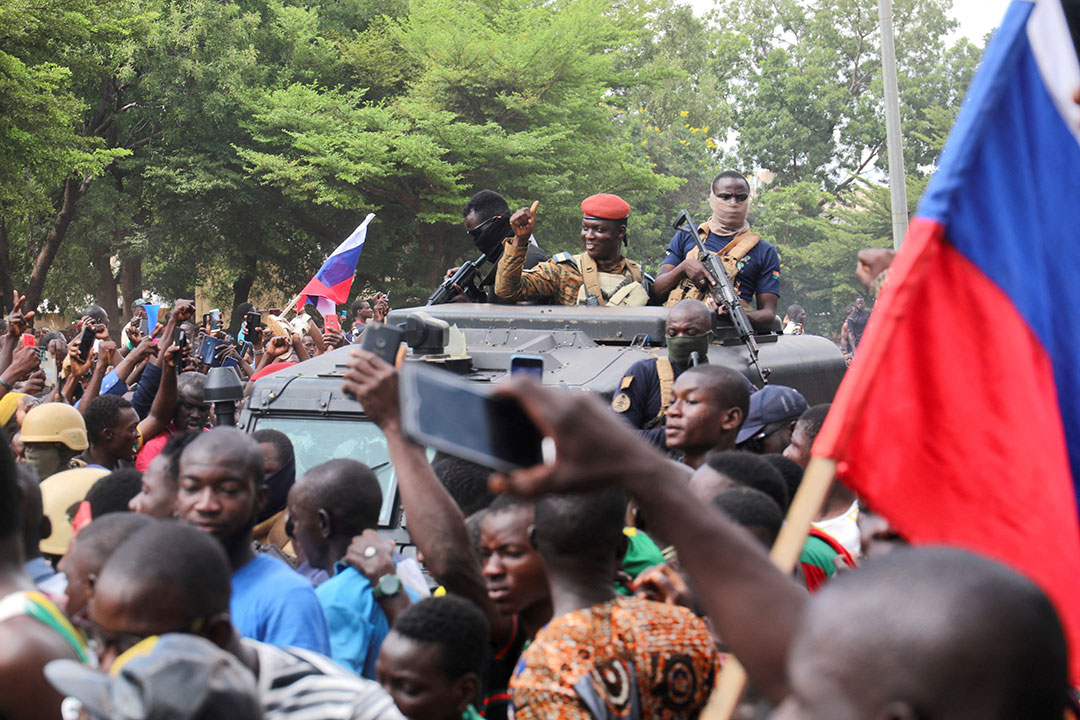Russia Flooding Burkina Faso With Disinformation
ADF STAFF
Despite the deteriorating security and economic landscape in Burkina Faso, there is a clear reason why the ruling military junta remains popular: Russian propaganda and disinformation.
It’s the same reason why a recent deployment of notorious Russian Wagner Group mercenaries, now known as the Africa Corps, to the capital, Ouagadougou, enjoys the same level of approval, despite the group’s history of atrocities against civilians in Africa.
“Russia has effectively seized opportunities to manipulate citizen frustrations through disinformation campaigns,” Torianna Eckles, of the Wilson Center think tank, wrote in a January 22 opinion piece.
“In Burkina Faso, Russian-generated disinformation has encouraged democratic backsliding, fostered coups and increased support for repressive regimes (domestically and abroad) regardless of their human rights records.”
Russia has been conducting a yearslong, wide-ranging disinformation campaign aimed at destabilizing Burkina Faso and other democratically elected governments in West Africa and the Sahel.
In 2021, cybersecurity experts warned Burkinabe President Roch Marc Kaboré that Russia was using an elaborate web of fake social media accounts and fake news sites to push pro-Russian, anti-democracy propaganda on YouTube and Facebook.
Burkina Faso has been fighting extremists linked to the Islamic State group and al-Qaida since 2015. Deteriorating security led to two military coups just eight months apart in 2022. Kaboré’s ouster by Lt. Col. Paul-Henri Damiba soon gave way to Capt. Ibrahim Traoré’s coup.
Since Traoré seized power, however, the number of Burkinabe killed by extremists has nearly tripled, and 2 million people have been displaced.
“Traoré has not yet faced widespread backlash despite a worsening security situation under his rule,” Eckles explained. “Instead, popular calls have been supportive of the coup leaders and, in general, in support of authoritarianism: ‘No to France, yes to Russia.’
“Russian disinformation operations across West Africa have led to an unprecedented rise in popular support for Russia, citizen demands for Russian interventions, and, in some cases, new military partnerships between African countries and Russia.”
An April 2022 report by the Africa Center for Strategic Studies identified 23 disinformation campaigns that targeted African countries dating back to 2014. Of them, 16 were linked to Russia.
A report on disinformation in West Africa, published in June 2023 by the Atlantic Council international affairs think tank, examined how Russia bombarded the Burkinabe people with Wagner Group propaganda.
“Calls for Russian assistance in fighting jihadists in Burkina Faso appeared to have been heavily influenced by Russia’s perceived military success in other African countries, including the Central African Republic (CAR) and Mali,” the report stated.
“The influence of CAR and Mali on anti-France and pro-Russia narratives was evident in the lead-up to Burkina Faso’s 2022 coup.”
According to the report, engagement on Facebook posts that mentioned the mercenary group increased by 6,363% in the four months before the coup.
Eckles said Russia has tested and refined its blueprint for disinformation success throughout Africa. “Russia’s disinformation campaign in Burkina Faso builds off the legitimate fears and frustrations of the Burkinabe population while reaffirming their concerns,” she wrote.
“Disinformation manipulates discontent, blaming France for Burkina Faso’s challenges, presenting Russia as a savior, exaggerating Wagner Group exploits, and embracing authoritarian leaders like Traoré who stand ready to partner with Russia.”
Russia has built a disinformation machine by impersonating and buying legitimate news outlets, social media accounts, and even a radio station. Russian operatives have created cartoons and movies to spread propaganda on the continent. They have paid local journalists, bloggers, activists, and social media influencers to spread disinformation and propaganda.
In Burkina Faso, paid influencers created groups to spread even more radical propaganda on WhatsApp and Telegram. The groups eventually were used to organize fake grassroots demonstrations and smear local and international journalists.
Eckles concluded that although Russia’s disinformation efforts in the region have effectively capitalized on grievances, they mask the ineffectiveness and consequences of its mercenary operations and a deep disregard for civilians.
“The Russian partnership does not prioritize Burkinabe citizens nor adequately address the country’s worsening security situation,” she wrote. “Russia’s primary goal is to extract resources and spread influence and military power in the region.
“It is not interested or capable of addressing the underlying causes of Burkina Faso’s economic malaise and instability.”


Comments are closed.